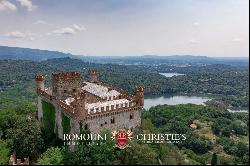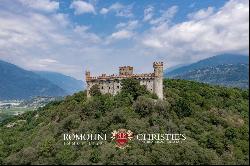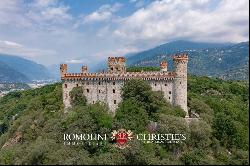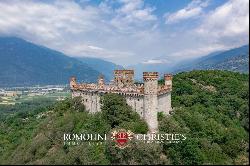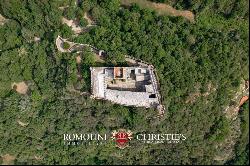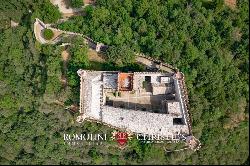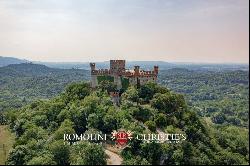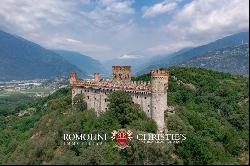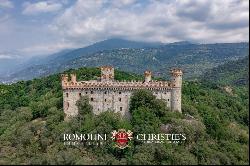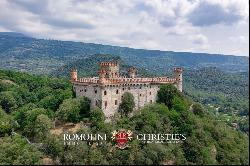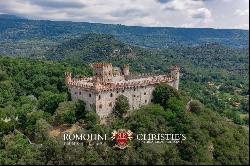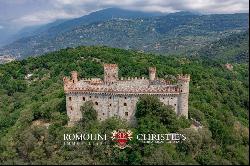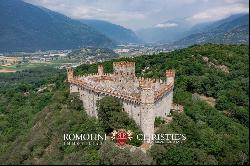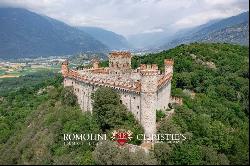出售, USD 5,139,345
皮埃蒙特, 意大利
楼盘类型 : 其他住宅
楼盘设计 : N/A
建筑面积 : 27,179 ft² / 2,525 m²
占地面积 : N/A
卧室 : 11
浴室 : 13
浴室(企缸) : 0
MLS#: 2151
楼盘简介
On top of Monte Crovero above the Lakes of Ivrea, the Castle of Montalto Dora dominates the surrounding valleys with its imposing silhouette. The building (over 2,000 sqm) revolves around a paved courtyard ideal for events and ceremonies, and includes 11 bedrooms, 13 bathrooms and a beautiful 15th-century chapel. The land around (6.6 ha) is home to a secondary keep and a cascina.
The town of Montalto Dora is just 2 km from the Castle and offers all the necessary services. Other historic cities of northern Italy and renowned ski locations can all be reached in less than two hours.
The castle is embedded in a breathtaking context: the Canavese is indeed a unicum when considering its environmental and geological peculiarities, since it bears the traces of ancient glaciations in the form of the famous Serra d’Ivrea and the five lakes (including Sirio, Nero and Pistono where one can swim). Because of these unique features, the area has been listed as a site of community importance by the EU.
DESCRIPTION OF THE BUILDINGS
The castle (2,030 sqm – 21,843 sqft, 9 bedrooms and 11 bathrooms) is laid on several misaligned floors that follow the irregularity of the rocky spur and revolve around a central paved courtyard (400 sqm – 4,304 sqft).
The lower floor is made up of the old dungeons, nowadays converted into cellars and storage rooms and covered with beautiful wooden ceilings: in these underground rooms one can easily see the rocks the castle is attached to.
On the ground floor, all around the paved courtyard, are many halls, a dining room with kitchen, bathrooms and an office. The latter was probably the original guard post since it is located right next to the main portcullis of the castle.
At an intermediate level, a mezzanine floor above the kitchen and inside the quadrangular tower, is home to two bedrooms with en-suite bathrooms (both easily accessed from the courtyard via a stone staircase).
On the first floor (piano nobile) are a huge reception room with fireplace, another living room with fireplace, three bedrooms with en-suite bathroom (one again the quadrangular tower) and two ample libraries with a connected reading room.
The tower has a further level on top which houses a beautiful bedroom with en-suite bathroom: from here one has a breathtaking view over the surrounding landscape.
In a corner of the main courtyard, right next to the portcullis, is the medieval chapel (90 sqm – 968 sqft) with frescoes dating back to the 15th century and a bell tower.
In another corner of the castle, accessed via a side courtyard, is the keeper’s apartment (75 sqm – 807 sqft) laid over two floors and made up of living room with kitchen and bathroom on the lower floor and two bedrooms with bathroom on the upper floor.
A secondary keep (220 sqm – 2,367 sqft) is located a short distance from the main castle and is made up of several rooms currently used as storages and depots. This building, also revolving around a central courtyard, was probably used in the past as a guesthouse for noblemen visiting the lord.
In a defiladed position below the castle is an old cascina (110 sqm – 1,184 sqft) to be restored and laid over two floors currently exploited as storage rooms. Being located along the slope, both floors of the building can be accessed directly from outside.
HISTORY, STATE AND FINISHES
The castle is built on top of monte Crovero, where there was already some sort of settlement in the Roman age. Between the 10th and the 11th century the castle was built and around 1000 AD it was made up of a fortified tower with a wall enclosing a few houses and a chapel dedicated to saints Ephesius, Mark and Eusebius. In 1141 the castle was listed as a possession of the Bishops of Ivrea.
The importance of the fortress during the Middle Ages was due to its positioning along the Via Francigena and the road connecting Ivrea and Valle d’Aosta.
In 1344 the building was inherited by the Savoy family who exploited its excellent position to expand its rule over the area. They also carried out a series of renovations and expansions which led the castle (more or less) to its current shape.
At the beginning of the 15th century, the property was conceded in use to the De Jordano family who kept expanding the castle by buildings the chapel we can see today.
In 1641 the fortress endured a heavy siege and, after its surrender, the interiors of the building were emptied and devastated by the conquerors led by the marquis D’Harcourt.
The castle passed then in the hands of several local families until it was inherited by count Severing Casana, who was the first to undertake the renovation of the building. For the project, he enlisted the services of two of the most influent architect of his time, Carlo Nigra and Alfredo de Andrade (who also supervised the restoration of the castles of Pavone Canavese, Saluzzo, Verrès and Fénis).
Subsequently abandoned for many years, the castle was mostly ruined when in the 1960s a new renovations was undertaken by the new owners: over twenty years, they managed to restore the majority of the castle to a usable and good-looking state.
Nowadays, the castle presents itself as a quadrangular building (roughly 180 m in perimeter) with four circular towers at its corners. The quadrangular keep granted a 360-degree view over the Lakes of Ivrea and ensured control over the valley. The internal halls of the fortress have been fully restored to preserve the original look of the castle as reconstructed by De Andrade. In recent years, a careful maintenance allowed preserving the castle in excellent shape. These works have preserved the original plaster and the cocciopesto, stone and wooden floors of the castle. The upper levels of the building, in particular, still boasts their manorial features such as smooth wooden floors, decorated wooden beams, coffered ceilings, etched stone fireplaces, period furniture and a series of little details that without a doubt increase the charm of the castle.
From the quadrangular tower one can also exit onto the wall walk running around the whole castle. First restored by De Andrade, the walk has preserved its 14th-century shape with the machicolations used in the Middle Ages to throw rocks, arrows and boiling water on the enemies at the base of the ramparts, and offers at the same time a stunning view on the surrounding landscape. The circular tower can also be entered from the wall walk and a staircase then leads to the roofs.
The chapel inside the courtyard bears traces of numerous 15th-century frescoes. The southern façade shows a representation of St. Cristoforo, attributed to Giacomino da Ivrea, and the Madonna del latte con bambino (the virgin Mary with the baby). The interior is made up of a single nave and features frescoes with scenes from the lives of Saints: on the left is St. Marguerite praying with the Dragon, at the center St. Liberata with St. Gervasio and Protasio and on the right St. Lucy. The monument has huge potential since inside the building is a decorative set of frescoes that are currently being studied.
EXTERIORS
The castle revolves around a beautiful 400-sqm paved courtyard that could be aptly used as a location for events, conferences, weddings and reenactment. Another smaller courtyard is located between the castle itself and the keeper's accommodation. From here, a staircase allows entering the small house.
All around the castle are 6.6 hectares of land covered in meadows, arable fields and lush woodland descending towards the valley ad the town of Montalto Dora.
A very distinctive feature of the property is the access road winding up the mountain, starting from a convenient parking area located just below the castle itself. The path, fully enclosed by crenellated walls, goes up the sl
更多
The town of Montalto Dora is just 2 km from the Castle and offers all the necessary services. Other historic cities of northern Italy and renowned ski locations can all be reached in less than two hours.
The castle is embedded in a breathtaking context: the Canavese is indeed a unicum when considering its environmental and geological peculiarities, since it bears the traces of ancient glaciations in the form of the famous Serra d’Ivrea and the five lakes (including Sirio, Nero and Pistono where one can swim). Because of these unique features, the area has been listed as a site of community importance by the EU.
DESCRIPTION OF THE BUILDINGS
The castle (2,030 sqm – 21,843 sqft, 9 bedrooms and 11 bathrooms) is laid on several misaligned floors that follow the irregularity of the rocky spur and revolve around a central paved courtyard (400 sqm – 4,304 sqft).
The lower floor is made up of the old dungeons, nowadays converted into cellars and storage rooms and covered with beautiful wooden ceilings: in these underground rooms one can easily see the rocks the castle is attached to.
On the ground floor, all around the paved courtyard, are many halls, a dining room with kitchen, bathrooms and an office. The latter was probably the original guard post since it is located right next to the main portcullis of the castle.
At an intermediate level, a mezzanine floor above the kitchen and inside the quadrangular tower, is home to two bedrooms with en-suite bathrooms (both easily accessed from the courtyard via a stone staircase).
On the first floor (piano nobile) are a huge reception room with fireplace, another living room with fireplace, three bedrooms with en-suite bathroom (one again the quadrangular tower) and two ample libraries with a connected reading room.
The tower has a further level on top which houses a beautiful bedroom with en-suite bathroom: from here one has a breathtaking view over the surrounding landscape.
In a corner of the main courtyard, right next to the portcullis, is the medieval chapel (90 sqm – 968 sqft) with frescoes dating back to the 15th century and a bell tower.
In another corner of the castle, accessed via a side courtyard, is the keeper’s apartment (75 sqm – 807 sqft) laid over two floors and made up of living room with kitchen and bathroom on the lower floor and two bedrooms with bathroom on the upper floor.
A secondary keep (220 sqm – 2,367 sqft) is located a short distance from the main castle and is made up of several rooms currently used as storages and depots. This building, also revolving around a central courtyard, was probably used in the past as a guesthouse for noblemen visiting the lord.
In a defiladed position below the castle is an old cascina (110 sqm – 1,184 sqft) to be restored and laid over two floors currently exploited as storage rooms. Being located along the slope, both floors of the building can be accessed directly from outside.
HISTORY, STATE AND FINISHES
The castle is built on top of monte Crovero, where there was already some sort of settlement in the Roman age. Between the 10th and the 11th century the castle was built and around 1000 AD it was made up of a fortified tower with a wall enclosing a few houses and a chapel dedicated to saints Ephesius, Mark and Eusebius. In 1141 the castle was listed as a possession of the Bishops of Ivrea.
The importance of the fortress during the Middle Ages was due to its positioning along the Via Francigena and the road connecting Ivrea and Valle d’Aosta.
In 1344 the building was inherited by the Savoy family who exploited its excellent position to expand its rule over the area. They also carried out a series of renovations and expansions which led the castle (more or less) to its current shape.
At the beginning of the 15th century, the property was conceded in use to the De Jordano family who kept expanding the castle by buildings the chapel we can see today.
In 1641 the fortress endured a heavy siege and, after its surrender, the interiors of the building were emptied and devastated by the conquerors led by the marquis D’Harcourt.
The castle passed then in the hands of several local families until it was inherited by count Severing Casana, who was the first to undertake the renovation of the building. For the project, he enlisted the services of two of the most influent architect of his time, Carlo Nigra and Alfredo de Andrade (who also supervised the restoration of the castles of Pavone Canavese, Saluzzo, Verrès and Fénis).
Subsequently abandoned for many years, the castle was mostly ruined when in the 1960s a new renovations was undertaken by the new owners: over twenty years, they managed to restore the majority of the castle to a usable and good-looking state.
Nowadays, the castle presents itself as a quadrangular building (roughly 180 m in perimeter) with four circular towers at its corners. The quadrangular keep granted a 360-degree view over the Lakes of Ivrea and ensured control over the valley. The internal halls of the fortress have been fully restored to preserve the original look of the castle as reconstructed by De Andrade. In recent years, a careful maintenance allowed preserving the castle in excellent shape. These works have preserved the original plaster and the cocciopesto, stone and wooden floors of the castle. The upper levels of the building, in particular, still boasts their manorial features such as smooth wooden floors, decorated wooden beams, coffered ceilings, etched stone fireplaces, period furniture and a series of little details that without a doubt increase the charm of the castle.
From the quadrangular tower one can also exit onto the wall walk running around the whole castle. First restored by De Andrade, the walk has preserved its 14th-century shape with the machicolations used in the Middle Ages to throw rocks, arrows and boiling water on the enemies at the base of the ramparts, and offers at the same time a stunning view on the surrounding landscape. The circular tower can also be entered from the wall walk and a staircase then leads to the roofs.
The chapel inside the courtyard bears traces of numerous 15th-century frescoes. The southern façade shows a representation of St. Cristoforo, attributed to Giacomino da Ivrea, and the Madonna del latte con bambino (the virgin Mary with the baby). The interior is made up of a single nave and features frescoes with scenes from the lives of Saints: on the left is St. Marguerite praying with the Dragon, at the center St. Liberata with St. Gervasio and Protasio and on the right St. Lucy. The monument has huge potential since inside the building is a decorative set of frescoes that are currently being studied.
EXTERIORS
The castle revolves around a beautiful 400-sqm paved courtyard that could be aptly used as a location for events, conferences, weddings and reenactment. Another smaller courtyard is located between the castle itself and the keeper's accommodation. From here, a staircase allows entering the small house.
All around the castle are 6.6 hectares of land covered in meadows, arable fields and lush woodland descending towards the valley ad the town of Montalto Dora.
A very distinctive feature of the property is the access road winding up the mountain, starting from a convenient parking area located just below the castle itself. The path, fully enclosed by crenellated walls, goes up the sl
处于意大利,皮埃蒙特的“STUNNING RESTORED CASTLE FOR SALE PIEDMONT MONTALTO DORA”是一处27,179ft²皮埃蒙特出售其他住宅,USD 5,139,34511。这个高端的皮埃蒙特其他住宅共包括11间卧室和13间浴室。你也可以寻找更多皮埃蒙特的豪宅、或是搜索皮埃蒙特的出售豪宅。

